Select Language
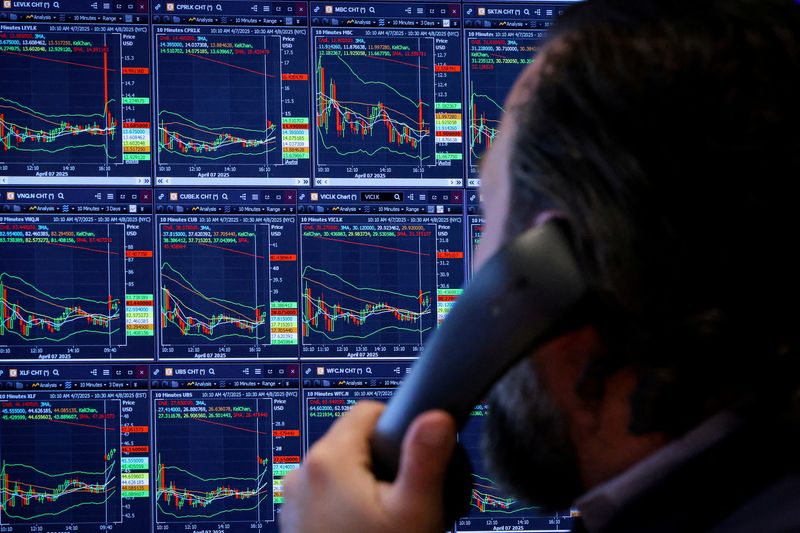
U.S. stock futures tick higher as the benchmark S&P 500 index remains within striking distance of an all-time high. President Donald Trump is reportedly toying with the idea of naming a replacement to Federal Reserve Chair Jerome Powell later this year, as Trump’s frustration with the central bank’s cautious policy decisions grows. Elsewhere, BYD shares dip on a media report that the Chinese electric car giant’s production has decelerated, while Shell denies reports that it is considering a purchase of rival BP (NYSE:BP).
1. Futures rise
U.S. stock futures pointed higher on Thursday, with the S&P 500 hovering just below record high levels reached in February.
By 03:10 ET (07:10 GMT), the Dow futures contract had risen by 84 points, or 0.2%, S&P 500 futures had increased by 14 points, or 0.2%, and Nasdaq 100 futures had climbed by 74 points, or 0.3%.
The main averages on Wall Street ended in mixed fashion on Wednesday, pausing a two-day rally, as investors gauged a ceasefire between Israel and Iran and assessed testimony from Federal Reserve Chair Jerome Powell.
Attention is now turning to the release of the key personal consumption expenditures price index on Friday. The Fed’s preferred inflation metric comes after Powell backed a wait-and-see approach to future interest rate decisions in his comments to Congressional lawmakers this week. Some policymakers, including Powell, have argued that this strategy is appropriate until more clarity emerges around the impact of aggressive U.S. tariffs on the broader economy.
"Markets seem to be trusting the ceasefire [...], and the dollar is back to testing its lows. Expect U.S. data to play a bigger role from here, especially since Fed Chair Powell’s cautious stance during his Congressional testimony included some subtle dovish hints," analysts at ING said in a note.
2. Trump comments on potential Powell replacement
Powell’s commitment to the Fed’s take-it-slow approach to policy has been frequently criticized by President Trump, who is eager to see the central bank follow many of its global counterparts in quickly slashing rates.
Not doing so is costing the government hundreds of billions of dollars in interest payments, Trump has claimed.
These comments, which have been regularly lobbed for much of the year and on Wednesday even included jibes at Powell’s mental capacity, have raised speculation that the president may soon move to replace him.
Trump suggested to reporters on Wednesday that he has narrowed down a list of potential successors to three or four people. The Wall Street Journal also reported that an exasperated Trump is mulling potentially selecting and announcing the replacement by September or October. The paper added that Trump’s anger with Powell could even prompt him to unveil the decision sometime this summer.
3. BYD slips on report of slowing production
Hong Kong-listed shares of Chinese electric vehicle leader BYD (HK:1211) (SZ:002594) fell more than 2% after a Reuters report revealed the company has slowed production and postponed its expansion plans, reversing its aggressive growth strategy.
Citing people familiar with the matter, the report detailed that BYD has cancelled night shifts and cut output by at least one-third at four of its Chinese factories. It also delayed the addition of new production lines, measures aimed at managing rising inventory and reducing costs.
BYD’s stock sank last month after the EV maker’s price cuts intensified concerns over rising competition and narrowing profit margins in the massive Chinese auto market.
Although BYD overtook Tesla (NASDAQ:TSLA), selling a record 4.27 million vehicles last year and targeting to reach 5.5 million this year, it has faced mounting pressure from swelling dealer inventory despite deep price cuts, the report said.
4. Shell says it is not mulling BP purchase
Oil major Shell has denied it was planning a takeover of peer BP, saying it is not pursuing a bid and is not actively considering one.
The company also said that under U.K. regulations, making such a statement prevents it from releasing a formal offer for the next six months.
The response came after a Wall Street Journal report on Wednesday claimed Shell was in discussions to acquire BP.
“In response to recent media speculation Shell wishes to clarify that it has not been actively considering making an offer for BP and confirms it has not made an approach to, and no talks have taken place with, BP with regards to a possible offer,” the oil giant said in the release.
“This is a statement to which Rule 2.8 of the Code applies and accordingly Shell confirms it has no intention of making an offer for BP. As a result Shell will be bound by the restrictions set out in Rule 2.8 of the Code,” it added.
The WSJ had reported that Shell was in “early-stage talks” to buy BP, citing sources familiar with the matter. The report said that the discussions between the two companies are “active,” with BP said to be weighing the approach “carefully."
5. Oil inches higher
Crude prices rose, adding to the previous session’s gains, as a larger-than-expected draw in U.S. crude stocks signalled firm demand from the world’s largest consumer.
At 03:40 ET, Brent futures climbed 0.2% to $66.54 a barrel and U.S. West Texas Intermediate crude futures rose 0.1% to $65.00 a barrel.
Both benchmarks climbed nearly 1% on Wednesday, recovering from early-week losses after data showing U.S. crude oil inventories falling for a fifth straight week, indicating resilient demand in the world’s largest economy.
U.S. crude inventories fell by 5.8 million barrels, the Energy Information Administration said on Wednesday, and gasoline stocks unexpectedly fell by 2.1 million barrels, as gasoline supplied, a proxy for demand, rose to its highest since December 2021.
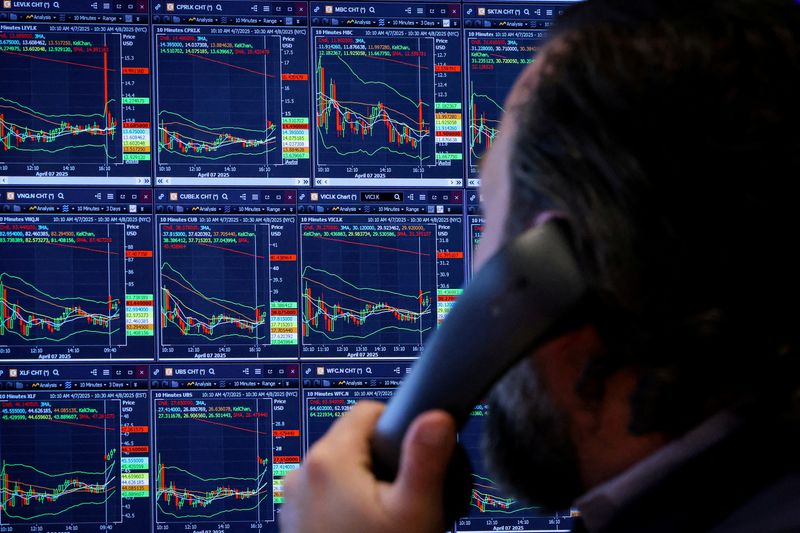
U.S. stock futures are subdued, with markets weighing hopes for a sustained ceasefire between Israel and Iran as well as fresh interest rate comments from Federal Reserve Chair Jerome Powell. Oil prices rise, but stay around multi-week lows, as a stop to the fighting in the Middle East appeared to remain in effect. Elsewhere, economic uncertainty clouds the financial outlook from delivery group FedEx (NYSE:FDX).
1. Futures muted
U.S. stock futures hovered above the flatline on Wednesday, as investors gauged a fragile ceasefire between Israel and Iran and assessed commentary from Powell.
By 03:40 ET (07:40 GMT), the Dow futures contract had inched up by 33 points, or 0.1%, and S&P 500 futures were broadly unchanged, while Nasdaq 100 futures edged up by 19 points, or 0.1%.
The main averages on Wall Street rose in the prior session, buoyed by expectations that, despite some heated rhetoric and an exchange of strikes, a formal halt to hostilities in the multi-day Israel-Iran conflict would hold.
Traders were also noting a modest shift in a dovish direction from Fed policymakers, although Powell used the first day of his testimony to Congress this week to underscore the central bank’s recent wait-and-see stance to future interest rate changes.
Still, markets are cautiously eyeing the looming expiration of a delay to sweeping U.S. "reciprocal" tariffs in early July, with the White House racing to secure deals with dozens of individual countries.
"Trade is the most acute risk facing markets, but investors are maintaining a very calm attitude toward this topic, confident that the ultimate impact won’t be much worse than the 10% baseline tariff," analysts at Vital Knowledge said in a note to clients.
2. Israel-Iran ceasefire holds
The Israel-Iran ceasefire brokered by President Donald Trump appeared to still be in place on Wednesday, one day after the regional rivals said they had ended an air war after 12 days.
Steve Witkoff, Trump’s envoy to the Middle East, said late on Tuesday that negotiations with Iran were "promising," adding that Washington is continuing to hope for a long-term peace with Tehran.
"Now it’s for us to sit down with the Iranians and get to a comprehensive peace agreement, and I am very confident that we are going to achieve that," Witkoff told Fox News’ "The Ingraham Angle" show.
Earlier on Tuesday, Trump announced the start of the ceasefire, but lashed out at both Israel and Iran for carrying on with attacks that seemed to have already been planned before the agreement was revealed. Trump previously came in on the side of Israel, ordering air strikes against Iranian nuclear facilities over the weekend.
Trump claimed that the strikes had "obliterated" the sites, but U.S. intelligence agencies have found that Iran’s enriched uranium stocks had not been eradicated and the nation’s mostly-underground nuclear program may have only been set back by a couple of months, according to media reports.
3. Oil ticks higher
Oil prices edged up, with traders keeping tabs on the resilience of the Israel-Iran ceasefire.
Yet crude remained around multi-week lows, weighed down by expectations that an easing in Middle East tensions will avert disruption to oil supply flows out of the oil-rich region. Worries had particularly swirled around whether Iran’s response to Israeli and U.S. strikes would be to stem shipping through the Strait of Hormuz, a key tanker thoroughfare located along Iran’s southern coast.
Brent crude had increased by 1.7% to $67.30 per barrel by 03:40 ET, while U.S. West Texas Intermediate crude futures had gained 1.8% to $65.53 a barrel.
On Tuesday, Brent settled at its lowest mark since June 10 and WTI since June 5. Both dates were prior to Israel’s surprise strike on Iranian military and nuclear facilities earlier this month.
4. Day two of Powell testimony to Congress
Attention now turns to Washington, where Fed Chair Jerome Powell is due to deliver his second day of testimony on Capitol Hill, this time to a Senate committee.
In prepared remarks released on Tuesday, Powell indicated that the central bank is prepared to maintain current interest rates while monitoring economic developments.
He described the U.S. economy as being in a "solid position" despite elevated uncertainty, with the unemployment rate remaining low at 4.2% in May. He noted that labor market conditions are "broadly in balance and consistent with maximum employment."
The Fed Chair acknowledged that inflation has "eased significantly" from its mid-2022 peaks but remains above the central bank’s 2% target. Total personal consumption expenditures prices rose 2.3% for the 12 months ending in May, while core PCE prices, excluding food and energy, increased 2.6%.
Facing a grilling from House lawmakers over why the Fed is not moving quickly to slash rates, an often-repeated demand from Trump, Powell said officials are wary that price gains could accelerate again soon due to the implementation of elevated U.S. tariffs.
5. FedEx earnings
Shares in FedEx sank in extended hours trading after the delivery giant and economic bellwether unveiled a current-quarter profit forecast that missed analysts’ expectations.
Along with United Parcel Service (NYSE:UPS), FedEx’s results offer a possible glimpse into the state of the wider economy.
Trump’s aggressive trade agenda -- especially towards top global exporter China -- has recently sparked a wave of uncertainty around growth, weighing on consumer confidence and leading many businesses to rein in spending plans until more clarity emerges.
Speaking in an earnings webcast, FedEx CEO Raj Subramaniam said that the global demand environment is "volatile." Executives added that Trump’s decision to scrap duty-free status for low-cost shipments from China-linked retailers like Shein and Temu have also dented the firm’s returns.
Memphis-based FedEx said it expects to deliver fiscal first-quarter adjusted profit of $3.40 to $4 a share, short of Wall Street projections of $4.06, according to LSEG data cited by Reuters. The company did not provide full-year earnings and revenue guidance as well, citing the murky operating backdrop.
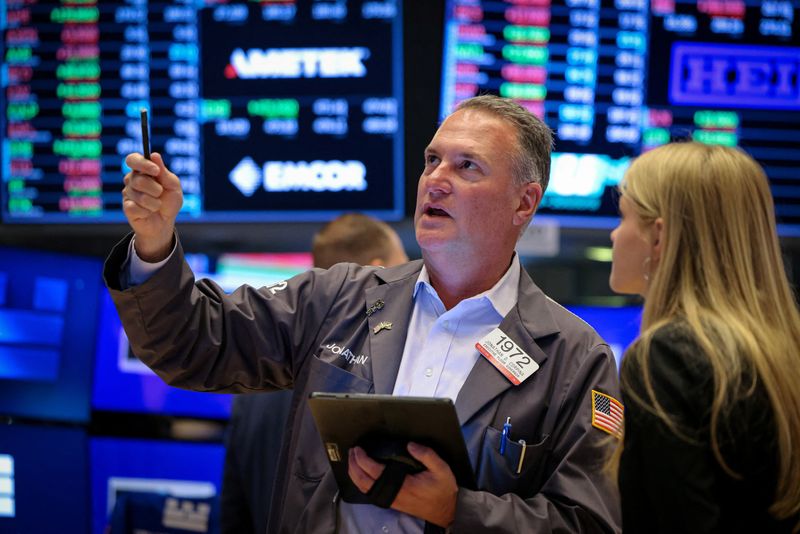
U.S. stock futures indicate a positive open for Wall Street, with President Donald Trump’s declaration of a ceasefire in the Israel-Iran conflict bolstering sentiment -- although key questions linger over the staying power of the halt to hostilities. Oil prices drop following the announcement, while gold falls amid faltering safe-haven demand. Meanwhile, the spotlight will be on Federal Reserve Chair Jerome Powell, who will deliver testimony to Congress this week during a time when he has come under heavy criticism from Trump.
1. Futures higher
U.S. stock futures pointed higher on Tuesday, as investors welcomed Trump’s announcement of a ceasefire in hostilities between Israel and Iran.
By 03:40 ET (07:40 GMT), the Dow futures contract had risen by 347 points or 0.7%, S&P 500 futures had gained 48 points or 0.8%, and Nasdaq 100 futures had advanced by 234 points or 1.0%.
The main averages on Wall Street ended the prior session in the green, boosted by hopes that U.S. involvement in the days-long Israel-Iran air war would remain relatively contained. Worries had swirled around the prospect of U.S. strikes against Iranian nuclear sites over the weekend causing a wider conflict in the Middle East, and potentially disrupting crucial oil supplies out of the region.
Iran responded to the attacks by launching missiles at a U.S. military base in Qatar late on Monday, but no injuries were caused. Trump called the response “weak.”
2. Trump proclaims Israel-Iran ceasefire
Trump has declared that the ceasefire between Israel and Iran is now "in effect," adding that neither side should violate it.
The statement has lifted expectations that the 12-day bout of fighting that included deadly air strikes has now come to an end.
However, Trump’s comments suggested that the ceasefire would take place in stages, with operations already underway being allowed to finish. An Iranian missile attack on Israel on Tuesday killed four people, according to Reuters, citing Israel’s ambulance service. Meanwhile, Tehran said an Israeli strike on northern Iran had killed nine people.
Still, questions surrounded the longevity of the ceasefire. Israel, who was joined by the U.S. in its bid to erase Iran’s nuclear and ballistic missile ambitions, said it had agreed to a halt in the violence, with Prime Minister Benjamin Netanyahu noting that the operation had achieved its objectives.
Iranian Foreign Minister Abbas Araqchi also said Tehran had no intention of continuing its retaliatory strikes moving forward, but stood ready to respond to any further aggression from Israel -- a sentiment that Netanyahu reciprocated.
3. Oil slumps
Oil prices tumbled in the wake of the ceasefire announcement, as fears eased over possible shipping disruptions out of the Middle East.
Since the outset of the conflict, traders had been eyeing concerns that Iran could move to cut off crude supplies flowing through the Strait of Hormuz, a major artery for global shipping that runs along the nation’s southern coast.
Oil had initially spiked with this possibility in mind, but began to fall after Iran’s attack on the U.S. base in Qatar was perceived as tepid and a precursor to a cooling in regional tensions.
At 03:16 ET on Tuesday, Brent crude futures slipped by 3.7% to $67.93 a barrel, while U.S. West Texas Intermediate crude futures dropped by 3.6% to $66.04 per barrel -- the lowest level since before Israel carried out its attacks on Iran earlier this month. Oil prices previously declined by 9% on Monday.
4. Gold retreats as safe-haven demand fades
Gold prices slipped over 1% in European trade, as fading geopolitical tensions prompted investors to shift away from safe-haven assets.
Spot gold declined 1.4% to $3,320.57 an ounce by 03:25 ET, dipping to its lowest level since June 11. Gold futures for August dropped 1.8% to $3,334.87/oz.
Meanwhile, news of the ceasefire put the U.S. dollar on the back foot, with an index tracking the currency against a basket of its peers inching down by 0.4% to 98.06.
The euro and the yen strengthened, buoyed by the slide in oil prices. Both the European Union and Japan rely on imports of crude, while the U.S. is a net exporter.
Benchmark 10-year Treasury yields were also broadly steady after edging lower on Monday following comments from a Federal Reserve official backing an interest rate reduction next month. Yields tend to move inversely to prices.
5. Powell testimony ahead
Markets are now turning their focus from the Middle East to Washington, where Federal Reserve Chair Jerome Powell is due to begin two days of testimony before Congress on Tuesday.
Powell will likely be grilled on the Fed’s decision to keep rates unchanged at its latest meeting and adopt a wait-and-see attitude to future borrowing cost changes. Policymakers, including Powell, have been especially wary of the uncertainty surrounding the impact of Trump’s aggressive tariff agenda.
Trump continued his ongoing campaign against Powell on Tuesday, writing on social media that Powell is a "very dumb, hardheaded person." He called for rates to be brought down by at least "two to three points," arguing that the U.S. will pay for Powell’s "incompetence."
"Crucially, markets may treat any tweaks in Powell’s stance as an indication that Trump’s political pressure has breached the independence shield of the Fed," analysts at ING said in a note to clients, adding that this "has the potential to drive substantial [U.S. dollar] depreciation."
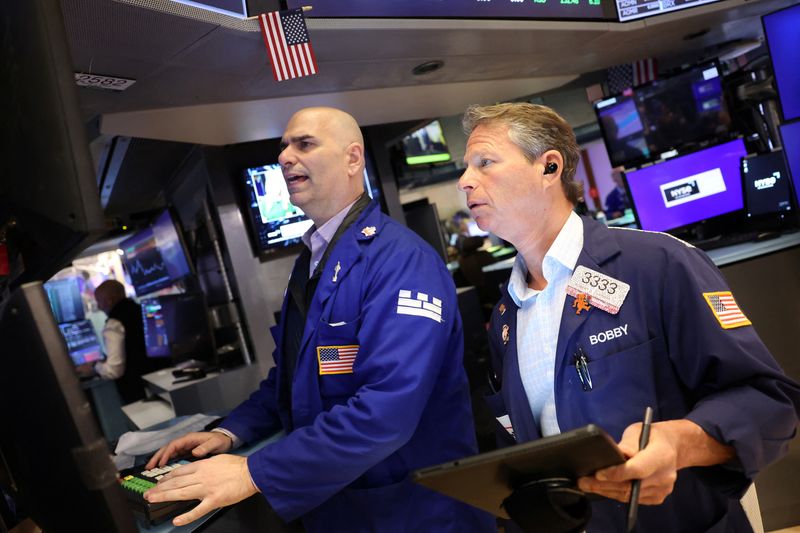
U.S. stock futures are muted and oil climbs in the aftermath of sudden U.S. strikes on Iranian nuclear facilities over the weekend. Uncertainty still surrounds Iran’s response to the attacks and how they could impact global oil and gas supplies, while U.S. President Donald Trump speaks about possible "regime change" in the country. Elsewhere, the U.S. Senate is aiming to pass its version of a Trump-backed fiscal bill and traders are keeping tabs on business activity data due out later on Monday.
1. Futures subdued
U.S. stock futures hovered around the flatline, as investors assessed the fallout from a U.S. decision to carry out strikes against Iranian nuclear sites over the weekend.
By 03:36 ET (07:36 GMT), the Dow futures contract had slid by 25 points, or 0.1%, while S&P 500 futures and Nasdaq 100 futures were mostly unchanged.
The main averages on Wall Street ended in the red on Friday, with investors anxiously eyeing developments in a multi-day air war between Israel and Iran -- and the potential involvement of U.S. military forces in the conflict.
President Trump erased much of this uncertainty when he announced that strikes on three nuclear facilities in Iran had been conducted on Saturday. Markets are now keen to see how the decision, which came after Trump previously suggested that he would take as long as two weeks to deliberate on a possible strike on Iran, could impact sentiment, inflation and interest rates.
2. Oil rises after U.S. strike on Iran
Much of the worry over price growth stems from oil, with traders warning in recent days that an escalation in the Israel-Iran fighting could lead to a disruption of key crude supplies, particularly in the Strait of Hormuz along Iran’s southern coast.
Some analysts have flagged worries that a spike in oil prices could refuel inflationary pressures, potentially leading the Federal Reserve to further delay potential interest rate cuts.
Brent crude futures for August jumped by 0.8% to $76.11 per barrel by 03:38 ET on Monday and West Texas Intermediate crude future rose by 0.9% to $74.48 a barrel. Both of the contracts have pared back some earlier gains.
"Since the U.S. targeted Iranian nuclear facilities over the weekend, supply risks for energy markets have increased significantly amid uncertainty about how Iran will retaliate," said Warren Patterson, Head of Commodities Strategy at ING, in a note.
3. Investors eyeing Iran’s response
Tehran has yet to give any clear indication of how it plans to respond to the U.S. attack, saying that it reserved all options to defend itself.
The Islamic republic has also warned of "everlasting consequences" and stepped up its aerial bombardments of Israel, which kicked off the violence 11 days ago with its own surprise strikes on Iranian nuclear infrastructure.
Iran has called Trump a "gambler" and seemed to hint that the weekend strikes have expanded the range of legitimate targets for its military. Trump, meanwhile, raised the question of regime change in Iran in a social media post on Sunday.
Media reports in Iran have suggested that the country is mulling blocking the Strait of Hormuz, a key artery for global oil and gas supplies being sent around the world from Middle East.
Other reports have said that Iran may target one of several U.S. military bases located throughout the region.
Some analysts have argued that, for financial markets, although tensions in the Middle East have now intensified, the strikes have removed at least one shroud of uncertainty around whether Trump would move to strike Iran.
"With the overhang of uncertainty lifted somewhat, the weekend events could wind up being a net positive," analysts at Vital Knowledge said in a note to clients. Still, they flagged that, "once geopolitics fade from the headlines," investors will still be facing "headwinds" from longstanding issues like tariffs and fiscal policy.
4. Senate’s version of tax-and-spending bill in focus
The U.S. Senate is reportedly aiming to hold a vote on their version of a massive tax-and-spending package this week.
Republican lawmakers are pushing to approve their update to the so-called "One Big Beautiful Bill Act," send it back to the House, and then have it placed on Trump’s desk for signing by a self-imposed deadline of July 4.
Backed by Trump, the measure includes the extension of 2017 tax cuts instituted during his previous term in office and increased expenditures on defense and border security. Some of these costs would then be offset by slashes to expenditures on entitlements like Medicaid, a federal health insurance program for low-income Americans that covers more than 71 million people.
But the Senate parliamentarian, the rules arbiter for the upper chamber, has issued recent guidelines stating that a selection of items in the package do not fall within budgetary rules. The nonpartisan referee flagged that Republican provisions such as a reduction in funding for the Consumer Financial Protection Bureau and other financial watchdogs may not be passed by a simple majority in the Republican-controlled Senate.
The GOP has been planning to use the so-called budget reconciliation process to help overcome Democratic opposition and pass the broader fiscal bill. In this process, some budget-related provisions can be approved by a simple majority instead of the Senate’s typical 60-vote threshold.
5. PMIs ahead
On the economic calendar, investors will be keeping tabs on business activity figures for June.
S&P Global’s manufacturing purchasing managers’ index is seen dipping to 51.1 from 52.0, while the services gauge is tipped to fall to 52.9 from 53.7.
The numbers will serve as a precursor to a range of economic data points due out this week, including a reading of consumer confidence on Tuesday and an inflation-measure closely followed by the Federal Reserve on Friday.
Consumer confidence in the U.S. has slumped over the past few months, as Americans express fears over the impact of Trump’s sweeping tariff agenda on inflation and growth. Yet price gains have remained relatively benign and hopes for a détente in global disputes over the levies have been bolstered by talks between the U.S. and China.
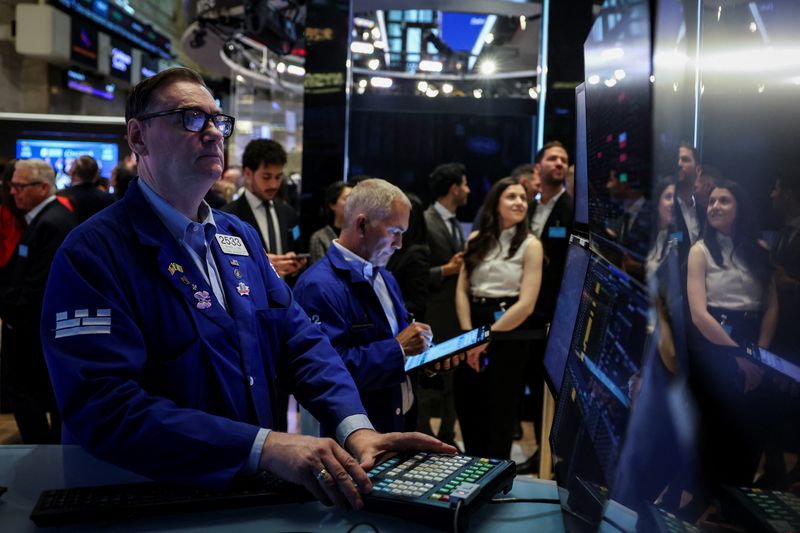
U.S. stock futures hover below the flatline, with markets still wondering if the U.S. could become involved in an intensifying conflict between Israel and Iran. The White House says President Donald Trump will make a decision on the matter within two weeks, while European foreign ministers are set to meet with Iranian officials as they look to ease tensions in the region. Brent crude prices drop, but are on track for a positive week, as worries remain over potential supply disruptions due to the fighting.
1. Futures dip
U.S. stock futures edged lower on Friday, as investors eyed developments in an ongoing air war between Israel and Iran that has now entered its second week.
By 03:36 ET (07:36 GMT), the Dow futures contract had slipped by 89 points, or 0.2%, S&P 500 futures had fallen by 10 points, or 0.2%, and Nasdaq 100 futures had dropped by 32 points, or 0.1%.
On Thursday, the main averages on Wall Street were closed for a public holiday, while global stocks declined and the U.S. dollar strengthened, with traders hunting for perceived safe havens in response to uncertainty around potential U.S. involvement in the Israel-Iran conflict.
Markets were also assessing a wave of central bank decisions, including announcements from the Bank of England, Norges Bank, and Swiss National Bank. A murky economic outlook due to Trump’s often erratic trade agenda played heavily into policymakers’ thinking. On Wednesday, officials at the Federal Reserve chose to leave interest rates unchanged and adopt a wait-and-see attitude to future policy changes.
2. Trump to decide on Iran strike within two weeks
Trump has said he will opt whether to join Israel in its air bombardments against Iran "within two weeks," according to the White House.
Reading a statement from Trump on Thursday afternoon, White House Press Secretary Karoline Leavitt said the timeline was "based on the fact that there is a substantial chance of negotiations that may or may not take place with Iran in the near future."
She declined to say if Trump would attempt to gain Congress’s approval before taking any military action against Iran.
Investors have been eagerly awaiting any clarity around Trump’s plans. Earlier this week, Trump suggested that he "may" or "may not" bombard Iranian nuclear sites.
Israel and Iran’s exchange of air strikes is now in its eighth day. The conflict began with surprise attacks by Israel against Iranian nuclear facilities, a move that Israel has defended as necessary to prevent Tehran from developing its nuclear weapons capabilities. Iran responded with its own barrage, and has claimed that its nuclear program is peaceful.
Neither side has indicated that they will back down. On Friday, European foreign ministers are set to meet in Geneva with their Iranian counterpart in a bid to ease the tensions.
3. Brent crude falls
Brent crude futures slumped on Friday following the White House’s comments, although the contract is on course to rise for a third consecutive week.
At 03:38 ET, Brent crude futures -- the price barometer for much of the world’s oil market -- had fallen by 2.3% to $77.02 per barrel. The U.S. West Texas Intermediate crude futures for August inched down by 0.1% to $73.84 per barrel.
Oil prices spiked by nearly 3% on Thursday, although trading volumes were relatively light due to the U.S. holiday. Oil has broadly gained since the beginning of the Israel-Iran fighting, with traders fretting that the conflict could spill into the wider Middle East region and possibly disrupt crucial supply flows -- particularly in the Strait of Hormuz, which runs along Iran’s southern coast.
Meanwhile, the U.S. dollar lost some momentum, as "markets still struggle to gauge the probability of the U.S." joining the conflict, analysts at ING said in a note to clients.
4. Home Depot bids for GMS - WSJ
DIY chain Home Depot (NYSE:HD) is making an offer for building-products distributor GMS, the Wall Street Journal has reported, citing people familiar with the matter.
The exact price of Home Depot’s bid could not be determined, the WSJ noted. Shares in GMS (NYSE:GMS) soared in extended hours trading.
On Wednesday, dealmaker Brad Jacobs’ QXO announced it had submitted its own unsolicited proposal to purchase GMS for roughly $5 billion, or $95.20 a share in cash.
Georgia-based GMS, which supplies tools and building materials for consumers and contractors, has been at the center of speculation around a potential takeover, as firms look to take advantage of a recent need for more housing in spite of tariff-related economic uncertainty.
5. SoftBank’s Son pitching $1 trillion AI hub in U.S. to TSMC, White House - Bloomberg News
SoftBank Group Corp. (TYO:9984) founder Masayoshi Son is seeking to partner with chipmaker TSMC and the Trump administration to build a $1 trillion, artificial intelligence-dedicated complex in the U.S., Bloomberg News reported on Friday.
Son plans to build a manufacturing hub and industrial complex that could rival China’s Shenzhen, the Bloomberg report said, citing people familiar with the “billionaire’s thinking.”
The complex will include production lines for building AI-powered industrial robots, and is largely aimed at bringing back high-tech manufacturing to the U.S., which is also a key goal of the Trump administration.
The proposed project is called “Project Crystal Land,” the Bloomberg report said, and it was unclear if TSMC was already involved in the venture. Son had reportedly discussed potential tax incentives with U.S. government officials, including Secretary of Commerce Howard Lutnick, and has also reached out to other tech firms for the project.
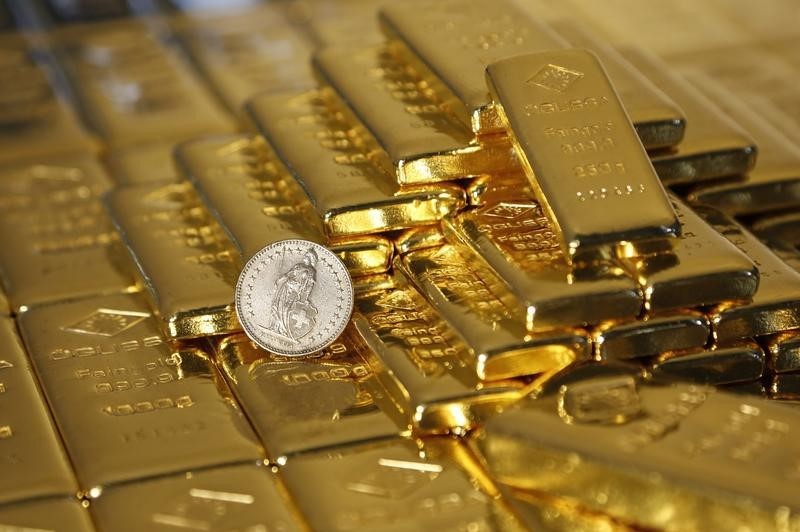
Gold prices fell in Asian trade on Thursday as the Federal Reserve’s hawkish stance strengthened the dollar and pressured bullion, while rising geopolitical risks from potential U.S. involvement in the Israel-Iran conflict capped losses.
Meanwhile, platinum reached a 10-year high during Asian hours, driven by tightening supply and rising demand.
Spot Gold fell 0.5% to $3,353.92 an ounce, while Gold Futures for August declined 1.1% to $3,369.77/oz by 02:15 ET (06:00 GMT).
Israel-Iran conflict, Fed’s hawkish pause spooks investors
Senior U.S. officials are preparing for a potential strike on Iran in the coming days, Bloomberg reported on Wednesday, citing people familiar with the matter.
While plans remain fluid, some officials pointed to the weekend as a possible window for action, the report said.
This comes after Iran’s Supreme Leader, Ayatollah Ali Khamenei, rejected President Trump’s demands for unconditional surrender, and said that neither peace nor war could be imposed on the Islamic Republic.
President Trump said on Wednesday he may or may not strike Iran.
Despite support from global risk-off sentiment, gold remained capped by the Federal Reserve’s hawkish pause on Wednesday.
The Fed held interest rates steady, paused on expected cuts for later this year, and warned of inflationary pressures from U.S. tariffs.
Lower interest rates bode well for gold prices as they reduce the opportunity cost of holding non-yielding assets like bullion.
Platinum hits over 10-yr high on supply crunch
Platinum Futures fell 0.5% to $1,313.0/oz after rising their highest level since September 2014.
A bullish industry report in late May sparked strong buying, as demand from Chinese jewelry makers and industrial users remains strong, while low inventories and high lease rates are constraining supply.
The metal is increasingly viewed as an attractive alternative to gold amid shifting investor sentiment.
Broader metal prices were lower, as the greenback strengthened after the U.S. central bank’s rate decision.
Silver Futures dropped 1.5% to $36.665 per ounce.
Benchmark Copper Futures on the London Metal Exchange fell 0.3% to $9,644.35 a ton, while U.S. Copper Futures dropped 0.7% to $4.8205 a pound.
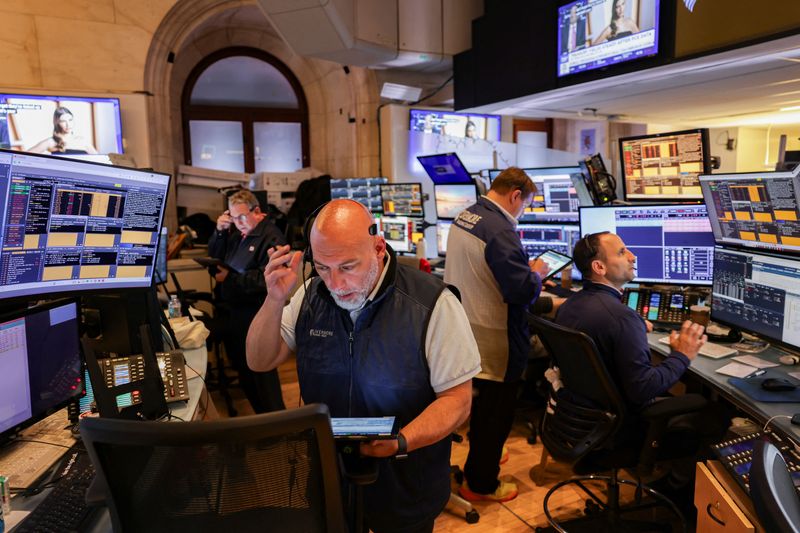
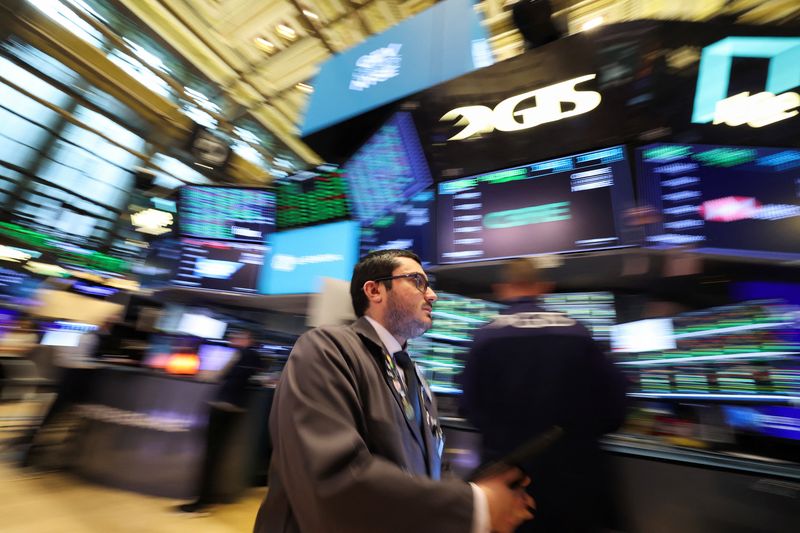
U.S. stock futures slip, with investors eyeing ongoing violence in the Middle East. Hopes remain for a truce in an exchange of airstrikes between Israel and Iran, with the White House reportedly discussing the possibility of holding talks with Tehran. U.S. President Donald Trump leaves a Group of Seven summit in Canada, but says the departure has "nothing to do" with a possible ceasefire. Elsewhere, the Bank of Japan says it will slow the pace at which it is reducing its monthly bond purchases from the next fiscal year.
1. Futures falter
U.S. stock futures fell on Tuesday, as investors gauged a fifth day of fighting between Iran and Israel, looked ahead to U.S. retail sales data later in the session, and assessed a fresh bond tapering decision from the Bank of Japan.
By 03:35 ET (07:35 GMT), the Dow futures contract had slid by 330 points, or 0.8%, S&P 500 futures had dropped by 44 points, or 0.7%, and Nasdaq 100 futures had declined by 157 points, or 0.7%.
The main averages on Wall Street ended higher on Monday, with analysts noting some moderation in worries over the impact of several days of airstrikes between Israel and Iran.
Comments from Trump at the Group of Seven summit in Canada also bolstered hopes that Washington could soon roll out new trade deals.
Trump suggested that an agreement with Canada -- a frequent target of his trade-related ire -- was possible, although he stressed that tariffs would still be involved. Canada, a major exporter of steel and aluminum to the United States, now faces U.S. levies on these metals, but Prime Minister Mark Carney said that the two countries could have a fresh economic and security deal wrapped up within 30 days.
Meanwhile, Trump signed a deal with the United Kingdom that formally lowers some import tariffs, yet steel and aluminum duties remained a key sticking point.
2. Israel says it has completed "extensive strikes" in western Iran
Israel’s military said on Tuesday that it had carried out "several extensive strikes" on military targets in western Iran, including on surface-to-surface missile storage sites and launch infrastructure.
A senior Iranian general "in the heart of Tehran" was also killed overnight, Israel’s Air Force claimed. Iran has not yet confirmed the statement.
The Trump administration is discussing with Iran the possibility of holding talks this week on a potential nuclear deal and an end to the conflict with Israel, Axios has reported. U.S. envoy Steve Witkoff and Iranian Foreign Minister Abbas Araghchi could meet as part of the proposed talks, Axios reported, citing four sources briefed on the matter.
While the meeting is yet to be finalized, it represents a renewed effort by Trump to lower hostilities between the two Middle Eastern powers and bring the focus back towards a nuclear deal.
Separate media reports have said that Iran has agreed to enter into negotiations only if Israel stops its bombing campaign.
Trump’s remarks about Iran have been hawkish, with the president stating that “everyone should immediately evacuate Tehran” and chiding Iran for not accepting an earlier nuclear deal. Trump has also repeatedly stated that Iran will not be allowed to enrich any uranium, despite Tehran’s claims that it has no plans to develop nuclear weaponry.
Oil prices edged up on Tuesday. Gold, a typical safe-haven destination during times of geopolitical or economic uncertainty, was steady.
3. Trump leaves G7 summit early
Trump has departed the G7 gathering in Canada early amid the hostilities between Israel and Iran, but he denied that his exit had anything to do with discussions over a potential ceasefire.
French President Emmanuel Macron had stated that Trump had told G7 leaders that talks were happening over a possible halt to the conflict.
In a social media post, Trump said the departure had "nothing to do with a CeaseFire," adding that it was instead related to something "much bigger than that." He did not elaborate further.
Prior to Trump’s exit, the G7 nations had issued a statement calling for an easing to the conflict, but placed their support behind Israel and described Iran as a source of instability in the Middle East.
4. Retail sales ahead
U.S. retail sales are set to highlight the economic calendar on Tuesday, with investors keen to see if Trump’s trade agenda is denting consumer demand.
Economists expect retail sales to decline by 0.5% month-over-month in May, following growth of 0.1% in April.
Despite ongoing anxiety over Trump’s aggressive tariffs, U.S. consumer sentiment improved for the first time in six months in June thanks to hopes for a trade détente between the U.S. and China, a survey from the University of Michigan showed last week.
But analysts flagged that, if geopolitical tensions cloud over sentiment and threaten to lead to a sustained jump in oil prices, the improvement could be short-lived.
5. BOJ decision
The Bank of Japan left interest rates unchanged as widely expected on Tuesday, and stated that it will reduce the pace at which it is tapering its monthly bond purchases from the next fiscal year.
The BOJ left its benchmark policy rate at 0.5% for a third consecutive meeting after a 25 basis point hike in January.
Starting from April 2026, the BOJ said it will cut its bond purchases by about 200 billion yen per quarter, compared to its current pace of 400 billion yen per quarter.
The move is likely aimed at reducing market disruptions while also maintaining sufficient support for the Japanese economy, which is grappling with increased headwinds from steep U.S. trade tariffs.
Along with the BOJ, a host of central banks are due to unveil their latest policy decisions this week, including the Federal Reserve on Wednesday.

Gold prices fell slightly in Asian trade on Monday amid some pressure from a strong dollar, although the yellow metal was sitting on strong gains as a worsening Israel-Iran conflict boosted haven demand.
The yellow metal saw some profit-taking on Monday after a nearly 4% jump last week, while resilience in the dollar, before a Federal Reserve meeting, also pressured metal prices across the board.
Spot gold fell 0.1% to $3,427.78 an ounce, while gold futures for August fell 0.2% to $3,446.45/oz by 00:57 ET (04:57 GMT).
Gold underpinned by Israel-Iran conflict, US intervention in focus
Gold’s stellar gains came late last week, after Israel struck several targets in Iran, including Tehran’s nuclear facilities.
The attack sparked bitter retaliation by Iran, which launched a series of missile strikes on major Israeli targets, including financial capital Tel Aviv. Some Iranian missiles were also seen breaking through Israel’s “Iron Dome” defense system.
The conflict marks a renewed escalation in tensions between the Middle Eastern countries, and spurred concerns over more regional powers getting involved.
Focus was also on any potential U.S. intervention in the conflict, after President Donald Trump said that his administration was working on hashing out a deal.
But Trump also said that Israel and Iran may have to “fight it out,” potentially signaling that a ceasefire was not close.
The missile exchange over the weekend also saw Iran cancel planned nuclear talks with the U.S., further diminishing the prospect of a deescalation.
Gold clocked strong gains as concerns over the conflict pushed traders into traditional safe havens, namely bullion.
Dollar strength pressures metal markets, Fed awaited
But gold’s gains were stalled by some resilience in the dollar before a Fed meeting this week. Broader metal prices also weakened.
Platinum futures were an exception, extending a recent rally by nearly 1% to $1,224.0/oz. The white metal hit an over four-year high last week.
Silver futures fell 0.3% to $26.260/oz.
Among industrial metals, benchmark copper futures on the London Metal Exchange fell 0.1% to $9,627.75 a ton, while U.S. copper futures fell 0.4% to $4.7972 a pound.
The dollar rose about 0.1% in Asian trade, seeing some favorability from increased haven demand.
Positioning in the dollar also increased before a Fed meeting this week, with the central bank likely to keep interest rates unchanged on Wednesday.
Focus will be squarely on Chair Jerome Powell’s comments on the path of interest rates, especially amid signs of cooling inflation and economic growth.
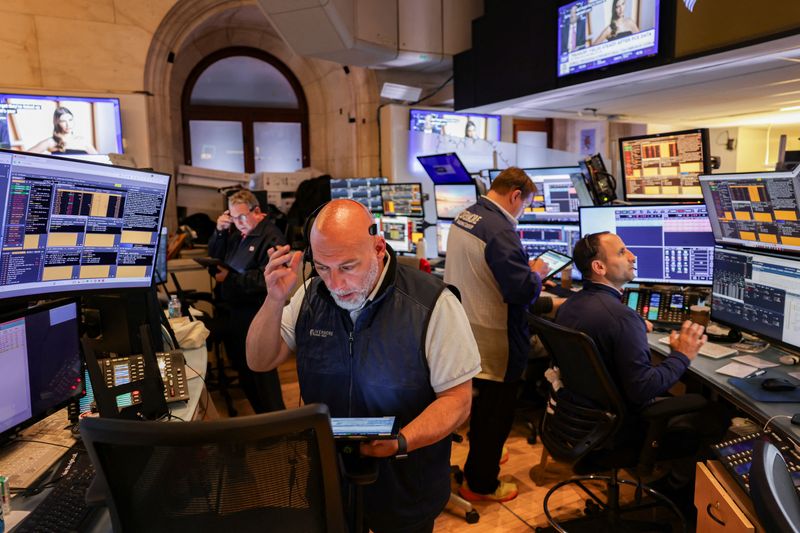
U.S. stock futures point sharply lower on Friday as investors react to an ratcheting up in tensions in the Middle East. Israel carries out large‑scale airstrike on Iran early Friday which hit “dozens” of military and nuclear targets, sending oil prices soaring. Elsewhere, the search continues for missing people after a fatal Air India crash that led to a decline in shares in Boeing (NYSE:BA) and other jet suppliers.
1. Futures drop
U.S. stock futures slumped, while oil prices surged, after Israel carried out a military strike on Iran.
By 03:45 ET (07:45 GMT), the Dow futures contract had fallen by 449 points, or 1.3%, S&P 500 futures had dropped by 83 points, or 1.4%, and Nasdaq 100 futures had shed 318 points, or 1.5%.
The prospect of escalating tensions in the Middle East -- a critical hub for oil production -- added to uncertainty for investors already grappling with heightened trade tensions that some fear could dent global growth.
Still, global stocks have posted an near-continuous rally since early April, with traders largely hoping that President Donald Trump’s tariff agenda may not be as aggressive as originally thought. Following relatively benign consumer and producer price reports for May this week, equities on Wall Street gained on Thursday.
2. Oil spikes after Israel strikes Iran
Oil prices surged on Friday in the wake of Israel’s large‑scale airstrike on Iran early Friday, which hit “dozens” of military and nuclear targets, according to media reports.
"Following the preemptive strike by the State of Israel against Iran, a missile and UAV (drone) attack against the State of Israel and its civilian population is expected in the immediate timeframe," Defence Minister Israel Katz said in a statement.
At 03:02 ET, Brent futures climbed 5.7% to $73.32 a barrel and U.S. West Texas Intermediate crude futures rose 6% to $72.13 a barrel. Both contracts hit their highest in almost five months, as traders worried that any conflict could disrupt shipping routes or oil infrastructure across the Gulf.
Reacting to a potential elevation in geopolitical risk, investors also shifted into perceived safe-haven assets like gold and the Swiss franc. The yield on the 10-year U.S. Treasury note, which moves inversely to prices, fell to a one-month low as well.
Iran launched around 100 drones towards Israeli territory in response, an Israeli military spokesman said. Sirens and a state of emergency were declared across Israel amid warnings of an imminent missile and drone counter‑strike from Tehran.
Iran’s state media confirmed reports saying that the strikes had killed Iran’s Revolutionary Guards Commander Hossein Salami, along with six nuclear scientists.
3. Air India crash latest; Boeing slides
Shares in Boeing lost more than 4% on Thursday, following a deadly crash of an Air India flight heading to London’s Gatwick Airport.
Over 240 people were killed in the accident, Reuters reported, adding that rescue workers are continuing to search for missing people and aircraft parts.
The plane -- a Boeing 787-8 Dreamliner carrying some 242 people -- crashed shortly after take-off from Ahmedabad in western India, in the world’s worst aviation disaster in years.
One person survived after the jet crashed into a medical college hostel in Ahmedabad, causing dozens of deaths on the ground.
GE Aerospace (NYSE:GE), whose GEnx-1B engines power the 787 Dreamliner, and Spirit AeroSystems (NYSE:SPR) also saw their share prices decline following the crash.
4. Adobe (NASDAQ:ADBE) results
Adobe raised its annual guidance after reporting better-than-expected fiscal second-quarter revenue, as its core digital media business continued to ride an artificial intelligence-led demand wave.
For 2025, the company upgraded its guidance for adjusted per-share income to between $20.50 to $20.70 on revenue of $23.50 billion to $23.60 billion, up from a prior range for adjusted EPS of $20.20 to $20.50, and revenue of $23.30 billion to $23.55 billion.
Digital media segment revenue is now expected to come in at between $17.45 billion and $17.50 billion, up from $17.25 billion to $17.40 billion previously.
The Photoshop-owner reported second-quarter revenue of $5.87 billion, topping analysts’ average estimates of $5.8 billion.
But shares in the company edged slightly lower in after-hours trading on Friday. Analysts at Vital Knowledge flagged that while investors "should come away relatively happy" with Adobe’s returns, its outlook "isn’t nearly as impressive" as cloud-computing group Oracle (NYSE:ORCL), which reported earlier this week.
5. University of Michigan sentiment ahead
Highlighting the economic calendar on Friday will be the University of Michigan’s survey tracking consumer sentiment and inflation expectations.
Economists anticipate that the survey, which has shown signs of deterioration in recent months as Americans fret over the impact of Trump’s tariffs, will recover somewhat in June.
"That would still leave it at a relatively subdued level, reflecting the still elevated inflation expectations component," analysts at ING said in a note to clients.
One-year inflation rate expectations are tipped to come in at 6.4%.
Data this week has shown that overall price pressures in the U.S. were broadly contained in May, although analysts have flagged lingering concerns that the effect of Trump’s tariffs has yet to be fully felt.

